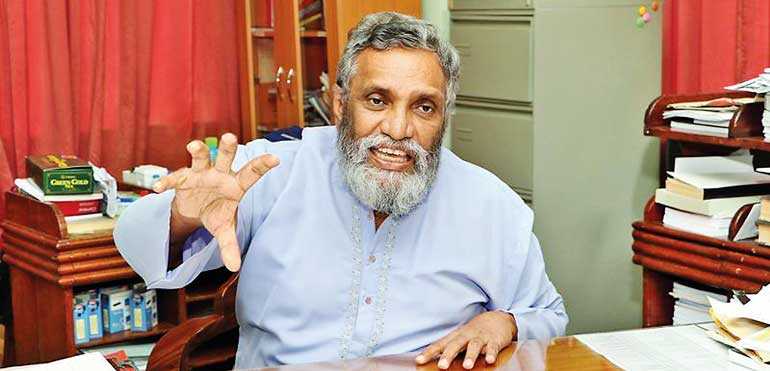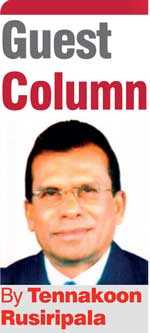Saturday Feb 14, 2026
Saturday Feb 14, 2026
Tuesday, 10 September 2019 00:00 - - {{hitsCtrl.values.hits}}

Elections Commissioner Mahinda Deshapriya
When an Act is passed by Parliament it becomes Law. Everyone has to abide by it. The Parliament of Sri Lanka passed the Provincial Councils Elections (Amendment) Act, No. 17 of 2017, which was certified on 22 September 2017. This was an amendment to the original Provincial Councils Elections Act No.2 of 1988.
This Act was passed by the Parliament following a Constitutional Amendment as published in the gazette in October 1987, which came to be known as the Thirteenth Amendment of the Constitution. The Thirteenth Amendment came to be in force from 14 November 1987. The main objective of this amendment was to establish Provincial Councils as a means of decentralising the Provincial administration. Simultaneously, the Provincial Councils Act No. 42 of 1987 was passed in the Parliament in November and this Act was certified on 14 November 1987. 
The Objective and the Title states that this Act comes into operation in respect of all or any of its provisions, on such dates as the President may appoint, by Order published in the Gazette, not being a date or dates prior to the coming into operation of the Thirteenth Amendment to the Constitution. Act No. 2 of 1988 was passed in Parliament and certified on 27th January 1988 to deal with the holding of elections to the newly-constituted Provincial Councils.
Section 127 of the Provincial Councils Elections Act No. 2 of 1988 provides for the Powers of the Commissioner of Elections under this Act.
Under the title ‘Removal of difficulties,’ it is stated as follows;
127 If any difficulty arises in first giving effect to any of the provisions of this Act. The Commissioner may, by order published in the gazette, issue all such directions as he may deem necessary with a view to providing for any special or unforeseen circumstances or to determining or adjusting any question or matter for the determination or adjustment of which no provision or elective provision is made by this Act. In this background let us now examine in detail the proposed amendment to this Act in 2017 which has caused the current imbroglio.
Provincial Councils Elections Amendment Act, No. 17 of 2017
A new section to the existing Act No. 2 of 1988 was inserted as section 3A to the principal enactment, with the following provisions, viz.
1. A delimitation commission to be appointed by the President within two weeks of the commencement of the Act (i.e. 22/9/2017)
2. The committee shall within four months of its appointment submit its report to the Minister
3. The Minister shall within two weeks of the receipt of such report, table it in Parliament for its approval by not less than two-thirds of the whole number of MPs
4. In the event the Parliament does not approve such report within one month of the tabling of the report, then the Speaker shall appoint a review committee consisting of five persons headed by the Prime Minister.
5. The review committee shall within two months of the Minister having referred the report for its consideration and thereafter submit its report to President.
6. After receipt of that report the President shall by proclamation forthwith publish the new number of electorates, boundaries, names assigned to each electorate so created on the report of the Review committee.
The SC, as reported in the Daily FT of 3 September 2019, says: “Elections cannot be held without delimitation report.” The news further states that the report demarcating the provincial boundaries submitted by the committee has been defeated by the Parliament. Then the matter was referred to a committee of five members headed by the Prime Minister. However due to the matter being delayed by the committee the President sought the opinion of the SC whether the Provincial Council Elections could be held under the old system. The President, as reported in the media, also sought the SC’s opinion on whether the polls could be conducted using the defeated delimitation report or the previous Act which existed before being amended in 2017.
The five-member bench of the SC has communicated its opinion to the President stating that the elections cannot be held under the new Act as well as under the Old Act.
The net result is that the citizens of the country are denied the opportunity of electing their representatives to a body created under the Constitution. It amounts to the denial of the fundamental right of each and every citizen entitled to exercise the universal franchise.
There are several questions that arise.
Are we all disillusioned by the proponents of democracy? Let us conclude this impasse by quoting some relevant scripts.
“Democracy itself is prone to focus group pressures as political parties manoeuvre to get elected, pending to what they think are the popular priorities. We look in vain most of the time for a political leader who is prepared to state upfront what his vision is for the society, one that goes beyond cosy platitudes about prosperity and fairness. None of them want to offer hostages to fortune in case they might have to deliver or, worse, fail to win the power to deliver. So they twist and tweak, get distracted by their little local difficulties; complain of unknown unknowns and the impossibility of pleasing everyone. Survival and not progress is what most settle for in the end, to get elected, or re-elected. When we ask why we should vote for them, they reply with a list of programs and policies but shy away from the main issues: to what aim? To build what sort of society?”
If we cannot ever say to ourselves “enough is enough,” we will never be free to explore other possibilities. All political careers end in failure, unless one leaves before the end, calling it enough.
Different is more fruitful than more of the same!